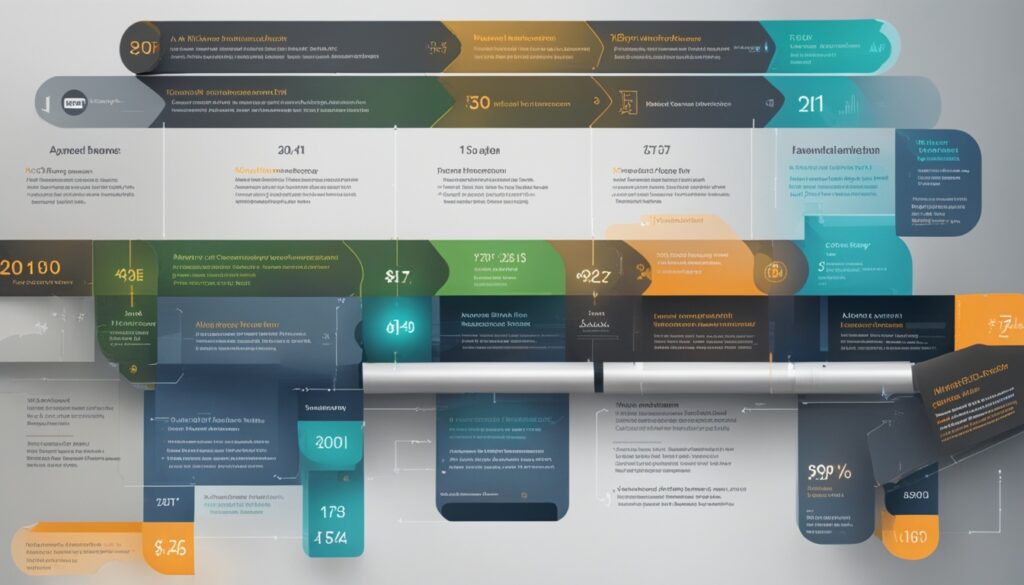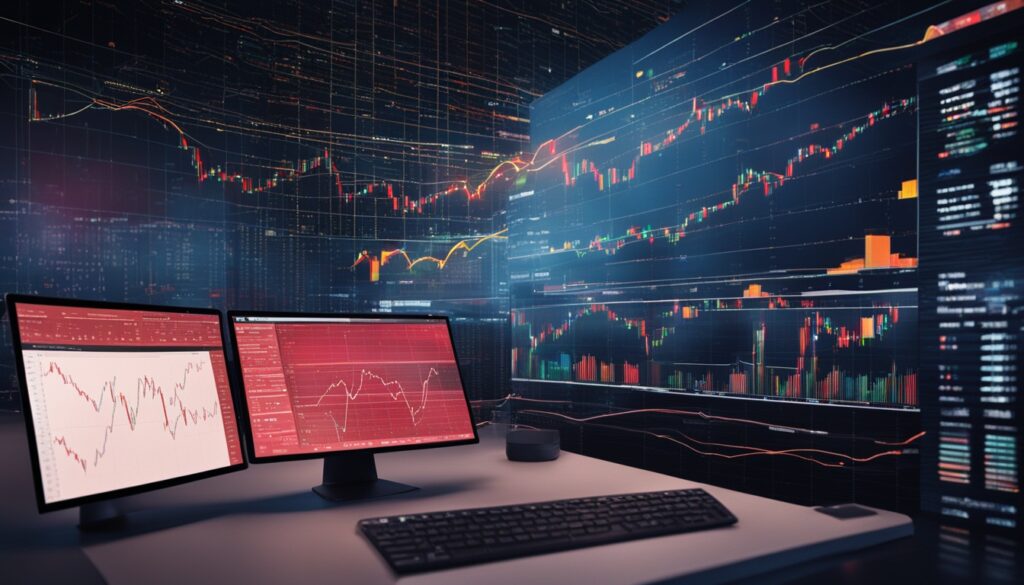Did you know that companies using Generative AI can beat their rivals by 1.4 to 1.6 times in finance? This fact shows how big a deal artificial intelligence is in finance and trading. AI is changing how we make investment choices and decide on financial moves, giving a big advantage to those who jump on board early.
AI brings better analysis, makes trading faster, and helps finance pros make smarter choices with up-to-the-minute data. With over 60% of U.S. stock market trades now automated, and personalized investment plans based on what customers like, the impact is huge.
This deep dive will cover AI’s history, how it’s used now, and what the future holds for finance. As companies plan to spend big on AI, using these tools is key to staying ahead. Discover how AI is reshaping marketing in this detailed article about AI in marketing.
Key Takeaways
- Generative AI can drive significant financial performance enhancements.
- Algorithmic trading represents a majority of trading volume in the U.S. markets.
- Personalized investment advice leads to improved portfolio performance.
- Sentiment analysis can accurately forecast market trends.
- AI solutions enhance both risk management and regulatory compliance.
- Robo-advisors offer tailored investment strategies based on individual needs.
The Rise of AI in Financial Services
The financial services industry has seen a big change with AI technologies. This change started many years ago. It shows how AI in finance has grown into today’s financial technology and AI solutions. Now, using machine learning in trading and operations is key for institutions to work better and save money.
Historical Overview of AI in Finance
AI in finance started in the late 1980s with early systems for tasks like algorithmic trading and risk management. As technology got better, financial companies used AI to solve problems more efficiently. Reports show AI has cut down on account rejections by 20% in banks. It has also greatly reduced fraud during payment checks, making financial transactions safer.
Growth of Machine Learning and Data Analytics
Big data and powerful computers made machine learning in trading a big deal in finance. Companies using advanced AI not only make things run smoother but also save a lot of money. For example, EY and a Nordic insurance company worked together and made claims processing much faster, which made customers happier.
AI also helps with managing wealth, saving banks millions by making things more efficient and giving deeper insights into customers. Companies like Bank of America use AI to suggest personalized investment plans. This makes customers more engaged and helps them adopt products better.

AI in Finance and Trading: Transformative Potential
AI is changing the stock market in big ways. It’s making how we plan and carry out financial strategies new. This tech is opening up new ways to make more money and handle risks better.
How AI Changes Investment Strategies
AI tools like automated trading systems make trades happen super fast, often in just milliseconds. This quick action gives investors an edge, letting them grab opportunities others miss. AI looks at past market data and predicts trends to help investors pick the best assets.
Impact on Decision-Making and Performance
AI is changing how investors make decisions. It gives them insights based on data, helping them see risks and chances better. AI checks real-time data for accurate market info. This helps financial groups manage risks better and follow rules with automated reports.
This sharp focus in decision-making cuts down risks and raises investment performance.

Algorithmic Trading with AI
Algorithmic trading with AI is a new way in finance that uses advanced computer algorithms to make trading decisions automatically. This method makes trading faster, reduces mistakes, and allows trades to be made quickly. It has become a key part of today’s financial markets.
Definition and Benefits of Algorithmic Trading
Algorithmic trading means using complex algorithms to look at market data, find trading chances, and make trades at the best prices. AI helps improve trading results with strategies like statistical arbitrage and trend analysis. AI’s speed lets it process and make trades in a split second, giving traders an edge in fast markets.
- Increased Efficiency: AI trading systems can quickly go through a lot of data, helping traders grab investment chances fast.
- Enhanced Accuracy: They learn from market data and make better trading choices, which can lead to higher returns.
- Cost Reduction: Algo trading cuts down on transaction costs by making trades at the best prices.
- Risk Management: AI does complex analyses like sentiment analysis and predictive analytics, leading to better risk management.
Case Studies of Successful AI in Trading
Big firms have shown how well algorithmic trading with AI works. For example, Renaissance Technologies LLC has used machine learning to boost their trading strategies, making a lot of money over time. Over 60% of trading in the U.S. stock market is now done by algorithms, showing how important AI is in the market. These examples show how AI is changing financial trading for the better.
Personalized Investment Strategies Powered by AI
In today’s fast-changing financial world, people want investment plans that fit their own goals. AI has changed the game, making it easier to create investment strategies that match what each person needs. Knowing what investors want is key to making good investment plans.
Understanding Retail Investor Needs
Retail investors need advice that fits their financial goals, how much risk they can take, and when they plan to reach their goals. AI helps by looking at lots of data to make investment plans just for them. This helps investors make better choices and get more involved with their money.
The Role of Robo-Advisors in Customization
Robo-advisors like Betterment and Wealthfront show how AI can make investing personal. They use smart algorithms to look at your financial info. This means they can give you investment advice that’s just right for you. With robo-advisors, managing your investments is easy, and you get advice that matches your financial dreams.
These AI systems make sure your investments are spread out right and adjust when the market changes. This keeps you on track to meet your financial goals. For more on how AI improves financial decisions, check out this resource.
Real-Time Market Insights through AI Technologies
AI has changed how investors get and understand market info. These tools give real-time insights, helping traders make quick, smart choices. AI looks at huge amounts of data, spotting patterns humans might miss, all day long.
Benefits of Instant Decision-Making
Quick decisions are key in finance. AI algorithms work fast, giving insights that match market changes. This boosts trading efficiency and risk management, offering big benefits for investors:
- Enhanced Trading Efficiency: AI makes super-fast decisions that adjust to market shifts.
- Emotional Mitigation: Algorithmic trading reduces the impact of emotions, leading to choices based on data.
- Comprehensive Risk Management: AI watches over trades, spots risks, and predicts price changes.
- Improved Visualization: Tools help traders see and understand data, making AI forecasts easier to grasp.
| AI Technologies | Functionality | Benefits |
|---|---|---|
| Machine Learning | Analyzes large datasets for pattern recognition | Enhanced investment strategies and accuracy |
| Deep Learning | Improves predictive capabilities | More robust forecasts on market trends |
| Natural Language Processing | Analyzes sentiment from financial news | Informed decision-making based on market psychology |
| Predictive Analytics | Forecasts future price movements | Proactive adjustments to investment strategies |
Sentiment Analysis: Gauge the Market Mood
Sentiment analysis is key to understanding market psychology. It uses AI to look at data from many sources. This gives us a clear picture of the market’s mood. Investors can see how people feel about stocks, sectors, or the whole market. This helps shape trading strategies and improve investment choices.
Understanding Market Psychology
Market psychology affects how investors act, shaping trends and prices. Sentiments change with market conditions. In good markets, people feel positive, which can push prices up. But in bad markets, negative feelings can lead to a drop in prices.
By looking at sentiment indicators, investors can see how traders feel. This helps them predict how the market might move.
Practical Applications of Sentiment Analysis
Tools like Brand24 are great at analyzing lots of data, like customer feedback. For example, Nike was mentioned over 428,000 times in a month. About 123,000 of those mentions were positive, showing people generally like Nike.
But Marvel’s sentiment analysis shows ups and downs, like the mixed reviews of the Ant-Man movie. This led to more negative mentions. Knowing how people feel can help traders spot market trends and adjust their plans.
- Brands can watch how people feel to change their marketing.
- Traders can use sentiment data to guess market changes and improve their trading.
- Studies show sentiment analysis is more accurate, helping with investment plans.
Advanced Financial Modeling with Generative AI
Generative AI is changing how financial services analyze and predict market trends. It combines past data with current trends for better forecasting. This makes predictions more accurate, helping in making smart decisions.
Financial institutions are spending a lot on AI, about $35 billion in 2023. They’re using this tech to improve their strategies.
Forecasting Market Movements
AI has changed how we predict market trends. It speeds up tasks like valuing companies and assessing risks. For example, Siemens saw a 10% boost in accuracy for financial reports.
BlackRock analyzed over 5,000 earnings calls a week with AI. This helped improve risk management a lot.
The Impact on Institutional Investment Strategies
Institutional investors use generative AI to make better investment plans. These AI systems help find new opportunities in the market. For instance, Upstart’s AI approves more borrowers than old methods, but still keeps rates low.
Platforms like Wealthfront use AI to tailor investment plans to each person. Generative AI also helps in making operations more efficient, like Allianz’s 15% revenue growth and big cost cuts after using AI.
This technology is set to change how we make investment plans and carry them out. As it grows, the financial market will see big changes in strategy.
| Institution | Implementation of AI | Outcome |
|---|---|---|
| Siemens | Advanced AI models for financial reporting | 10% increase in prediction accuracy |
| BlackRock | Analysis of earnings transcripts and broker reports | Enhanced data quality and risk management |
| Upstart | AI-powered lending platform | 44.28% more borrower approvals |
| Allianz | AI in underwriting and pricing | 15% revenue growth, 30-50% cost reduction |
Risk Management and Compliance in Financial Services
AI has changed the way financial services work. It helps analyze huge amounts of data quickly. This makes it easier to spot risks and follow rules.
Reducing Risks with AI Solutions
AI is key in spotting fraud and lowering financial risks. It uses machine learning to get better at finding risks fast. This means banks can watch risks in real-time.
By using AI, banks can manage risks better. They can check for compliance automatically and make processes smoother.
Ensuring Regulatory Compliance through Technology
Technology is now key for banks to follow complex rules. AI helps by looking at lots of data to check creditworthiness. It also helps automate checks and watch for problems.
But, using AI comes with challenges. Things like bias in algorithms and ethical issues need careful handling. This ensures AI is used right in following rules.
Investment in AI-Powered Tools and Technologies
The financial sector is changing fast thanks to the investment in AI technology. Banks and other financial groups see AI as a big help in making things run smoother and bringing new ideas to life. They’re putting more money into AI, especially in machine learning and understanding human language. This tech shift is changing how people trade and giving investors more chances to grow their money.
Current Trends in AI Investment
AI is now key in many investment plans. Tools like algorithmic trading and AI-driven advice help investors keep their money safe and spread it out right. Big investors use advanced tools to trade better, giving them an edge. A study found that many finance leaders think AI will become a big part of their work, with even more growth expected by 2025.
This rise in AI use means better decision-making and more accurate forecasts. Studies show AI models are beating old-school methods in many areas.
The Future of AI in Finance and Trading
The future of AI in trading looks bright. By 2027, AI in finance could hit $130 billion. New AI systems will help banks and other financial groups make sense of huge amounts of data, spot patterns, and predict trends in real time. The rise of AI stocks, like Nvidia, shows how well people are responding to these new technologies.
These tools are making trading smarter and giving regular investors access to insights once only for the big players. As AI keeps getting better, it will change how financial services work, focusing more on what customers need.
| Trend | Description | Impact on Finance |
|---|---|---|
| Algorithmic Trading | Real-time analysis and execution of trades using AI algorithms. | Improved speed and accuracy in trading activities. |
| Sentiment Analysis | Evaluating market psychology through NLP. | Better understanding of investor behavior and market movements. |
| AI Advisors | AI tools provide investment recommendations tailored to portfolio health. | Increased accessibility for retail investors to sophisticated investment strategies. |
Conclusion
AI has changed finance and trading in big ways, bringing new strategies and ways to manage risks. It makes things more efficient by automating tasks, helps with better decision-making through data, and improves how customers experience financial services. By using AI, financial groups are making smarter choices and working more efficiently.
Predictive analytics is also key. It helps traders and financial experts see what the market might do next. This lets them make better moves in uncertain times. As finance looks into AI in finance and trading innovations, it must also think about keeping data safe and following rules. A mix of AI and human thinking is important to get past these issues.
The future of finance looks set for big changes thanks to AI. It’s all about using AI in a way that boosts productivity and leads to better financial results. AI could save a lot of money and make things more efficient in finance today. For more on these trends, including new tech and ethical thoughts, check out this in-depth analysis.
FAQ
What is the impact of AI in finance and trading?
AI has changed finance and trading by making analysis better, improving trading, and helping make smarter decisions. It does this by analyzing data in real-time and understanding market feelings.
How has artificial intelligence evolved in the financial services sector?
AI started in the late 1980s in finance, doing tasks like algorithmic trading and risk management. Now, with better machine learning and data analysis, it’s more powerful. This is thanks to more data and stronger computers.
What are the benefits of algorithmic trading with AI?
Algorithmic trading makes things more efficient, cuts down on mistakes, and speeds up trades. AI helps companies do much better, making over 60% of trades in the U.S. stock market.
How do AI applications in the stock market improve investment strategies?
AI helps stock market investors by giving real-time insights, making decisions better, and reducing risks with data analysis.
What role do robo-advisors play in personalized investment strategies?
Robo-advisors like Betterment and Wealthfront look at your financial info to give you tailored investment advice. This leads to better portfolio performance and more people getting involved in investing.
How does sentiment analysis work in finance?
Sentiment analysis uses AI to understand market feelings by looking at different data sources. It predicts market moves and gives insights that help with trading decisions, making them very accurate.
What advancements are associated with generative AI in financial modeling?
Generative AI improves financial modeling by mixing past data and trends to forecast future performance. Institutional investors use it for planning and assessing risks.
How does AI contribute to risk management and compliance in financial services?
AI helps with compliance checks and reduces risks by looking at transaction data. This makes risk management better in financial places and helps follow changing rules.
What are current trends in AI investment within the financial sector?
Financial companies are putting more money into AI to drive innovation and efficiency. They’re focusing on machine learning and natural language processing.
What is the future of AI in finance and trading?
The future of AI in finance and trading is all about getting better and more integrated. It will keep making investment strategies smarter and improving financial results.




